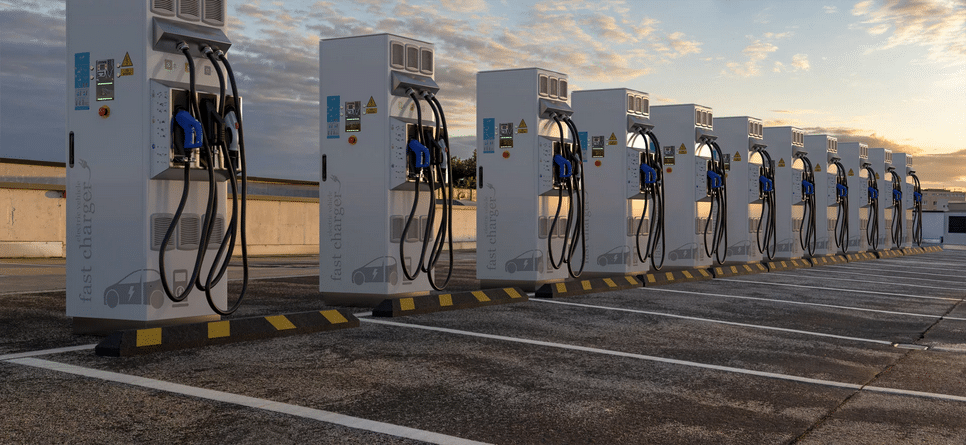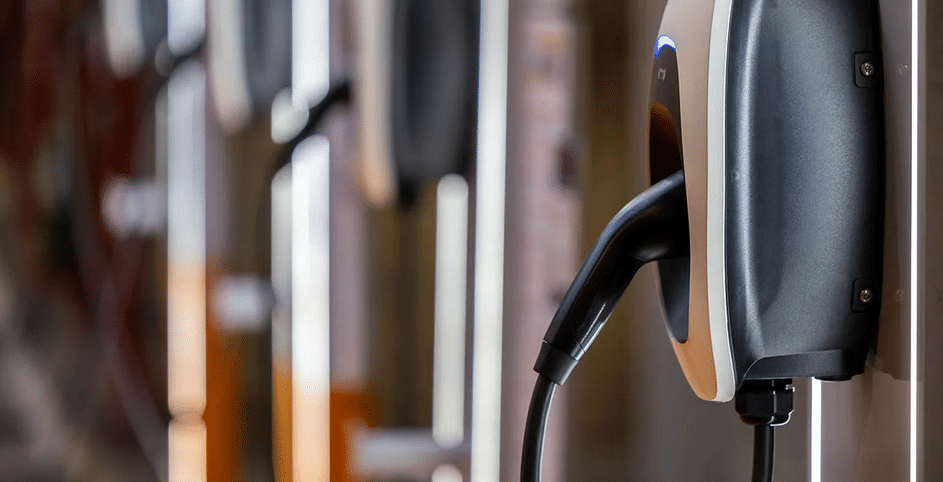How Cellular Connectivity Is Helping to Transform EV Charging
The latest Kelley Blue Book estimates highlight a continued upward trajectory in the U.S. electric vehicle (EV) market. With a year-over-year growth of 11% in Q3 2024, EV sales reached a new high both in terms of volume, with approximately 346,309 units sold, and market share, which climbed to 8.9%. This reflects a steady gain from 7.8% in Q3 2023 and a 5% rise from Q2 2024.
These figures underscore a growing consumer shift toward EVs amid expanding model availability, enhanced range capabilities, and evolving infrastructure. The rising market share indicates broader acceptance and a trend toward sustainable options, likely driven by increased public awareness, incentives, and advancements in EV technology, as well as increased availability of EV charging stations.
Iot-Connected Chargers Are Important in the Transition From Gas to EV
IoT-connected chargers have become pivotal in easing the EV transition for drivers and supporting grid stability. These chargers can provide real-time data on availability and charge levels, allowing drivers to locate open chargers easily and minimize wait times, which significantly reduces range anxiety.
Moreover, the integration of IoT connectivity enables these chargers to communicate directly with the grid, which is crucial for load balancing. IoT connectivity enables grid operators to adjust power output based on grid demand and even schedule charging during off-peak hours, which can prevent energy surges, reduce costs for drivers, and lessen the strain on the grid. For home chargers, cellular connectivity means the charger doesn’t have to rely on the owner’s wi-fi and allows remote diagnostics and maintenance, over the air upgrades, and more.
This dynamic approach ensures that both EV drivers and utility providers benefit, paving the way for smoother EV adoption and supporting the broader push towards sustainable energy.
Joint Office Announces 200,000 Public EV Charging Ports, NREL Estimates 28 Million EV Charging Ports Needed by 2030
The Joint Office of Energy and Transportation’s milestone of 200,000 public charging ports, achieved on October 22, 2024, marks significant progress toward the Biden-Harris Administration’s goal of a robust 500,000-charger network by 2030. By doubling the national EV charging network in just a few years, this initiative is ensuring accessible and reliable EV charging options across all 50 states, helping to alleviate range anxiety and promote EV adoption.
This accelerated growth in charging infrastructure supports the administration’s objectives for clean energy and sustainable transportation, providing more Americans the option to travel long distances with electric mobility.
The National Renewable Energy Laboratory’s (NREL) estimates highlight the significant shift towards EV adoption and the essential role of charging infrastructure in supporting this growth. By 2030, with 33 million EVs projected on the road, the need for 28 million charging ports reflects a balanced approach to accommodate daily charging habits and long-distance travel.
Most charging demand will be met through private Level 1 (L1) and Level 2 (L2) chargers, especially at single-family homes, which are expected to make up 92% of all charging ports. This aligns well with the EV user behavior of charging primarily at home or work, where the majority of charging will occur at lower power levels that fit into daily routines.
For multifamily housing, workplaces, retail, and hospitality settings, an estimated 2.1 million L2 chargers will provide accessible charging options in more public or shared spaces, supporting those without personal charging capabilities and encouraging EV adoption across various demographics.
Public DC Fast charging (DCFC) stations, which make up about 1% of the total infrastructure, will be crucial for drivers without regular access to at-home charging and for those traveling long distances. These high-speed chargers will help to alleviate range anxiety and ensure a smooth driving experience, providing essential coverage along highways and in urban areas with limited off-street parking.

EV Charging Companies May Be Missing an Important Part of Business Operations
EV charging companies continue to grow quickly, along with the fast-moving electric vehicle (EV) revolution in America. EV charging companies may be missing an important part of business operations as they grow. That important part of doing business is the licensing of patents for the cellular technologies used by the charging companies.
Avanci’s EV Charger Licensing Program Boasts 46 Patent Owners on its Platform
Avanci’s licensing program for connected EV chargers allows charger makers or network operators to simply and efficiently license patents for the cellular technologies they use. The company’s program launched in December 2023, and already has 46 patent owners on board, as well as four charger makers (ADS-TEC Energy, Easee, Eaton and GARO) on board as licensees.
Avanci’s EV Charger program brings together licensors and licensees to create a simple and efficient licensing program for connected chargers using 4G, 3G and 2G cellular communications. An EV charger manufacturer can sign a single, comprehensive license, that covers essential cellular patents (4G, 3G, and 2G) from 46 licensors today, as well as any who may join in the future. This streamlined approach provides manufacturers with a level-playing field, paying a one-time licensing fee per charger for its entire operational life, making it a cost-effective and transparent solution.
By offering fair, published rates, Avanci supports manufacturers of various connected EV chargers—from home-based units to public multi-outlet systems—ensuring compliance with essential cellular technology standards without complex negotiations. This program is essential in accelerating the deployment of smart chargers, enhancing connectivity and integration within the EV ecosystem, and supporting scalable infrastructure expansion. The program was built from Avanci’s experience in offering one-stop licensing programs for connected vehicles. Avanci 4G Vehicle, launched in 2016, now spans more than 100 auto brands covered for their connected vehicles to the patents of almost 60 licensors, with over 175 million licensed vehicles (including many EVs) under license.
Early Licensee Discounts Available Until December 5, 2024
Avanci’s EV Charger program is offering early licensee discounts available until December 5, 2024, the one year anniversary of its launch.
In December 2023, the new program launched, led by Marianne Frydenlund, Vice President of IoT at Avanci. Commenting on the launch, Kasim Alfalahi, founder & CEO of Avanci, said: “We are proud to launch Avanci EV Charger, a new program for the Internet of Things, expanding on our experience in creating the one-stop marketplace for connected vehicle licensing. Avanci brings a simpler, more efficient approach to sharing the work of thousands of inventors at companies and research institutes around the world.”
Avanci Simplifies the Licensing Process
Avanci operates as an independent facilitator of patent licensing solutions, bridging various industries to simplify the licensing process. The company works with potential licensees and licensors to develop market-driven solutions. By offering standardized, comprehensive licenses, Avanci streamlines access to essential patents, particularly for technologies that require cross-industry collaboration, such as cellular-connected EV chargers and IoT devices.
This approach provides manufacturers with predictable licensing terms, reduces the complexities of individual negotiations, and ensures that patent holders receive fair compensation for their innovations. Through these efforts, Avanci fosters efficiency, convenience, and predictability in technology-driven sectors, accelerating the adoption of connected solutions across industries.
Avanci Offers Predictable, Fixed Licensing Rates for Smart EV Chargers
Avanci’s EV Charger licensing model offers manufacturers long-term cost stability by ensuring that royalty rates remain fixed throughout the license term. This rate stability holds regardless of the addition of new 2G, 3G, and 4G essential patents to the license, and the number of new licensors that join the Avanci EV Charger program.
This approach provides predictability and transparency for manufacturers, allowing them to budget and plan without concerns about fluctuating licensing fees. By keeping rates constant, Avanci supports broader EV infrastructure growth, enabling manufacturers to adopt essential connectivity standards confidently and cost-effectively.

EVinfo.net appreciates Avanci’s facilitation of patent licensing solutions for the EV charging industry, and highly recommends Avanci.
Contact Avanci at 214-765-9500 in its Dallas, Texas office, or use the website contact form. Additionally, visit Avanci’s LinkedIn page.

Electric Vehicle Marketing Consultant, Writer and Editor. Publisher EVinfo.net.
Services